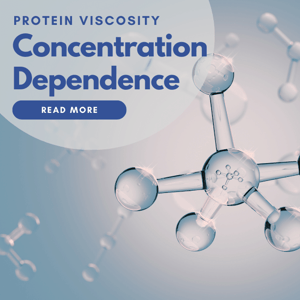
A Tale of Two Proteins
Application Note Download
Viscosity is a measure of the molecular interactions within a fluid. Concentrated protein solutions are complex fluids consisting of various characteristic length scales and component interactions. Therefore, viscosity measurements can be used to infer information about protein formulations. The rheological behavior will reflect differences in protein size as well as the formation of complex structures or networks resulting from various types of molecular interactions.
Viscosity measurements can also probe how formulation changes impact protein solutions. A commonly used rheological modifier in protein formulation is the amino acid arginine. Arginine is a charged amino acid at neutral pH, with a side chain comprised of a three-carbon chain ending with a charged guanidyl group. In this application note we show that arginine reduces the viscosity of a model antibody-like protein bovine gamma globulin (BγG), while curiously increases the viscosity of a model globular protein bovine serum albumin (BSA). These results demonstrate that viscosity is a useful tool that can probe and characterize both proteins and excipients used in formulation science.

.jpeg?width=300&name=Woman%20scientist%2c%20documents%20and%20hands%20writing%20_575258496-min(1).jpeg)


.png?width=200&height=58&name=RheoSense%20Logo%20(REGISTERED).png)



